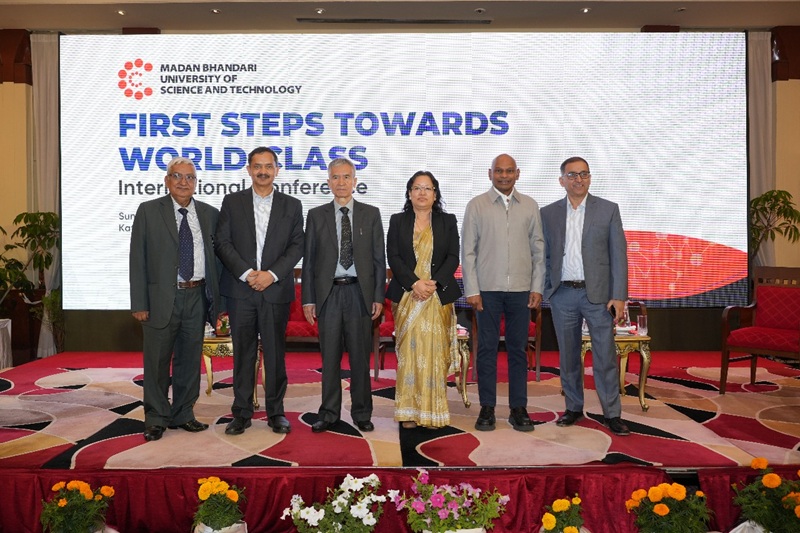Building a World-Class University: Madan Bhandari’s Vision for Nepal’s Skilled Workforce
4th May 2025, Kathmandu
Experts and academic leaders from around the globe have highlighted the potential of Madan Bhandari University of Science & Technology to address Nepal’s growing demand for practical and technical education. This sentiment was echoed during an international conference organized by the university in Kathmandu on Sunday, titled “First Step Towards Building a World-Class University.”
Building a World-Class University
Speaking at the event, Richard Miller, Founding President of Olin College of Engineering, Boston, emphasized that investments in practical education represent the most meaningful form of educational development. Expressing his commitment to supporting Nepal’s newly established technology-focused university, he stated that producing skilled human resources requires collaboration among the government, policymakers, academia, and society.
Similarly, Bruce Flesner, former Vice President of the American University in Cairo, described Nepal as having strong potential for the successful operation of technical universities. He encouraged investors to engage enthusiastically with Madan Bhandari University of Science & Technology, underlining the significance of education that is directly useful in daily life.
Seeram Ramakrishna, former Deputy Vice President of the National University of Singapore, presented Singapore’s rapid academic progress as an example. He said that with clear vision and commitment to quality education, Nepal too could develop world-class institutions. “Investment in research, scientific laboratories, and higher education institutions is key to a prosperous future,” he said, urging policymakers to focus on these areas.
Former World Bank Nepal Director Kenichi Ohashi urged the government to focus on productivity-enhancing policies. She advocated for practical, inclusive, and technology-friendly policymaking and emphasized that Nepal has the potential to develop effective and indigenous implementation models. “Skilled students will play a vital role in this transformation,” she added.
Prof. Dr. Rajendra Dhoj Joshi, President of Madan Bhandari University, said that the dream of building a world-class institution had come true. He stressed the need to maintain high academic standards and called for international collaboration to ensure long-term success. He noted that the university is conducting research in mushrooms, kiwi, organic vegetables, AI, and agriculture, attracting global research attention.
Former Education Minister Giriraj Mani Pokharel hailed the university’s establishment as a major leap forward in Nepal’s higher education sector. He emphasized the distinct roles of universities established under different frameworks, such as health, technical, and open universities, and their contributions to fostering entrepreneurship and national development.
Public-Private Partnerships Strengthened
During the event, a Memorandum of Understanding (MoU) was signed between Prof. Dr. Rajendradhwaj Joshi, the President of Madan Bhandari University, and Om Krishna Shrestha, Proprietor of Ares Mushroom Farm. Shrestha shared that a lack of research knowledge had created challenges in starting his business, but expressed commitment to assisting students in mushroom production and research.
Speakers in the conference’s inaugural session included Prof. Dr. Suresh Manandhar, Head of the Department of Artificial Intelligence; Prof. Dr. Dev Raj Adhikari; and MBUST trustee Bhanu Acharya.
The international conference drew enthusiastic participation from scholars, researchers, and policymakers from Nepal and abroad, aiming to establish long-term global partnerships for the university.
Experts Call for Secure Data Centers and Market-Oriented Education
In the second session of the conference, experts underscored the need for Nepal to build secure data centers and provide market-driven technical education to support economic transformation.
Birendra Pandey, First Vice President of the Confederation of Nepalese Industries, said that domestic industrialists are ready to assist students with skill development and market access. He noted that his organization also provides scholarships to student researchers and remains committed to promoting entrepreneurship.
Recalling Singapore’s past energy limitations, Prof. Dr. Seeram Ramakrishna highlighted how the country now rivals Australia in solar power. He asserted that with practical education and clear national policies, even seemingly impossible goals become achievable. He also emphasized the urgent need to develop secure data centers to adapt to the changing workforce shaped by artificial intelligence.
Madan Bhandari University of Science and Technology students presented their research topics to a panel of industrialists, entrepreneurs, and academics. MBUST Professor Anupama Shrestha explained that the university emphasizes advanced agricultural laboratories, community collaboration, and practical skill-building. She stressed connecting students with industry, fostering entrepreneurship, and building global networks.
Deepak Pandey, Chairperson of Larke Himalayan Herbal Industry Pvt. Ltd., noted that the partnership with the university allows students to engage in research, lab work, and the collection and processing of Himalayan herbs.
Global Collaboration and Outreach to Enhance Educational Quality
A panel discussion on “The Power of Stakeholders’ Engagement in building World-class University” emphasized that global collaboration and outreach are essential to improving education quality. Participants highlighted the importance of strong relationships between institutions and their alumni, including those living abroad.
Dr. Govinda Pokharel, former Vice President of the National Planning Commission, emphasized the need for domestic technical manpower and advocated for universities to design curricula aligned with national development goals.
Prof. Dr. Rajendra Dhoj Joshi reiterated the university’s mission to provide quality technical education, while Dr. Seeram Ramakrishna emphasized that institutions must have modern curricula, technology-driven teaching, and global cooperation to achieve results. “Nepal can even attract students from India, China, and the U.S. if we focus on consistent research and innovation,” he said.
Former Auditor General Bhanu Acharya warned that unstable national policies negatively affect educational reform. He said real change is only possible when political leadership shows resolve and commitment. “Technology transfer and research must be prioritized through policy,” he added.
Former Planning Commission Member Sangita Singh emphasized the importance of quality education, international networking, and regular engagement with alumni and the Nepali diaspora. “The global Nepali community can play a major role in fundraising, policymaking, and technology transfer,” she stated.







